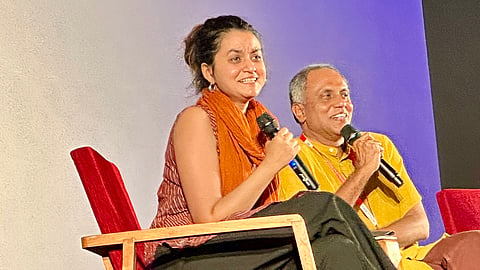

Between moments of laughter and lightheartedness at the International Film Festival of Kerala, filmmaker Payal Kapadia raised some serious concerns about the state of independent cinema in India. There are people like her making these films and a devoted audience to watch but few places to show, she said while speaking at an interaction on Wednesday, December 18, at the International Film Festival of Kerala, which screened her debut feature film All we imagine as light.
Payal spoke to a hall full of audience on how she made her acclaimed film, the struggles of indie filmmakers and why there should not be censorship in a film festival.
“Films are the space for discourse. You cannot have democracy without discourse. We can’t have censorship in film festivals,” she said, when H Shaji, deputy director of the Kerala Chalachitra Academy, told her about the ‘bans’ in earlier editions of the IFFK. Films, chosen for screening at the IFFK and even the IDSFFK (International Documentary and Short Film Festival of Kerala) were taken off by the Union government, forcing the filmmakers to go to court or else arrange alternate screenings at the last possible minute.
Payal is known for protesting against the Union government in her days as a student of the Film and Television Institute of India, a story that resurfaced when she won the prestigious Grand Prix at Cannes last year, becoming the first Indian filmmaker to do so. The government’s decision to not choose her film as India’s entry for the Oscars and later for the Indian Film Festival of India, was seen by critics as one of spite.
Payal’s fight against the system is even reflected in the title of her film, All we imagine as light, about two Malayali nurses in Mumbai, their friendships and other relationships. “In our culture, we are expected to follow certain things, because that is the way [things are done]. Like we won’t do films because it is our way to study engineering / medicine. Or that it is our way to be married at a certain age. In Hindi we say ‘aisa hee hai’ but my question is why. For me the ‘Prabha’ [in the Hindi title] is the possibility. In a place where you are so conditioned that you think there is only one way, that you can't imagine there is another way, I want to say it is possible, and that is only how change happens,” Payal said.
She admitted that she had a lot of privilege growing up with a mother who’s an artist, getting exposed to the idea of filmmaking at a young age. She had wanted to be an editor but in the end turned out to be a filmmaker. “Maybe it was a good thing I didn't get admission for editing”, she said, laughing. But unlike her, there are many who want to be in films but do not get the opportunity. There is an underrepresentation of women filmmakers, as there is for members of marginalised castes, she said, adding that grants would help in a big way, for there should be representation from the many diversities in India.
Two Malayali actors Kani Kusruti and Divya Prabha played the lead characters of the migrant nurses in Mumbai, while Chhaya Kadam essayed the role of a woman forced to return to her village home because she is losing her house in Mumbai. She highlighted friendship between women in her acceptance speech at the Cannes.
“In our society, it is a reality that men are there even if we don’t want them – the lingering ghosts of men that women don’t want,” she said, sharing a story about her grandmother. The woman was widowed in her 50s but into her 90s would think of her husband coming back as her memory faded, and then be disturbed by it. She had put that into her film, she said. And played with different “feelings” of time - the first half unfolding over many days in Mumbai while the second half took place on a very long day in Ratnagiri.
“There is no time for people, especially for those who have difficult jobs like that of a nurse, in a city like Mumbai. We are made to believe it is a good thing, but I am not for it. People deserve to have free time, time of their own. I wanted my characters to take a break and go somewhere,” she said. In the film the journey was not for leisure but to help a friend who has lost her home.”
Hailing praise on her actors and her crew, especially her co-writers, Payal said that it was a collaboration as the film was in a language that she did not speak.